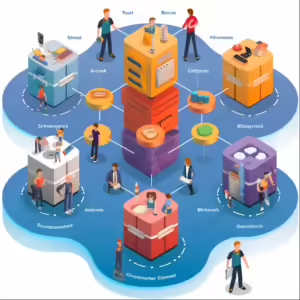Web services: cornerstone of modern online applications
Web services are a fundamental component in today's connected world, enabling communication and data exchange between different applications and systems over the Internet. This article provides an in-depth look at the world of web services, how they work, types and importance for developing modern software applications.
What are web services?
Web services are standardized software components that are accessible over a network, typically the Internet, and enable different applications to communicate with each other and exchange data. They use a set of protocols and standards to ensure interoperability between different software applications written in different programming languages and running on different platforms.
Core features of web services
- Interoperability: Web services enable interaction between applications written in different programming languages and running on different platforms.
- Self-describing: They use standards such as WSDL (Web Services Description Language) to describe their interfaces.
- Communication over networks: Web services communicate over the Internet using protocols such as HTTP, SOAP (Simple Object Access Protocol) and REST (Representational State Transfer).
Types of Web Services
- SOAP-based web services: They use the SOAP protocol, a standardized protocol based on XML, for message exchange.
- RESTful Web Services: These use the REST architectural principle, which is based on standard Internet protocols such as HTTP and uses a simpler, resource-oriented approach to communication.
- XML-RPC and JSON-RPC: These are simpler than SOAP and REST, allow functions to be called in remote systems and use XML or JSON for data exchange.
Application areas of web services
- E-Commerce: Web Services enable the integration of various services such as payment gateways, inventory management and customer relationship management.
- Cloud services: They play a central role in the delivery of cloud-based applications and services.
- Enterprise applications: Web services enable integration and communication between various enterprise applications and systems.
- Social networks and APIs: They are used to share data and functionality between social media platforms and other applications.
Advantages of Web Services
- Flexibility and Scalability: Web Services provide a flexible and scalable architecture for developing and extending applications.
- Cost reduction: Reusing existing services can reduce development costs and time.
- Platform independence: Web services enable interaction between different software applications, regardless of the platform.
challenges
- Security: Ensuring security and privacy when using web services is an ongoing challenge.
- Complexity: Developing and managing web services, especially in large and complex systems, can be challenging.
Conclusion
Web services are a crucial part of modern software development and architecture. Their ability to seamlessly connect disparate applications and systems has made them an indispensable tool in the information technology landscape. As technology advances and the need for interoperable and efficient online services grows, the importance of web services will continue to increase.






